#devops foundation certification
Explore tagged Tumblr posts
Text
Devops Certification | Devops Foundation Certification
The GSDC Certified DevOps Foundation certification provides validated proof of a solid understanding of DevOps methodologies. As DevOps practices are being rapidly adopted across industries, this foundational certification equips candidates with highly relevant and desirable knowledge.
#devops foundation certification#devops foundation certification cost#certified devops foundation#devops foundation certification online#devops foundation certificate#gsdc devops certification#devops certification#devops certification gsdc#certified devops engineer#devops engineer certification
0 notes
Text
Master SRE & DevOps with ScholarAcad – Your Path to IT Excellence
In today’s fast-paced IT landscape, DevOps Master CERTIFICATION TRAINING COURSE IN CANADA and Site Reliability Engineering (SRE) have become crucial for businesses aiming to enhance operational efficiency, scalability, and automation. If you are looking to advance your career in these high-demand fields, ScholarAcad provides top-tier training and certification programs designed to help professionals excel.
Why DevOps & SRE? Modern IT infrastructures rely on seamless collaboration between development and operations teams. DevOps accelerates software delivery, improves quality, and ensures continuous deployment, while SRE (Site Reliability Engineering) focuses on system reliability, automation, and performance optimization.
Explore ScholarAcad’s Premier DevOps & SRE Certifications 1. SRE Foundation The SRE Foundation course introduces core reliability principles, automation techniques, and monitoring strategies essential for ensuring high system availability. This certification helps IT professionals bridge the gap between development and operations while mastering Google’s SRE framework. DevOps Foundation ( DOI ) CERTIFICATION TRAINING COURSE IN CANADA
If you’re new to DevOps, the DevOps Foundation course provides a strong understanding of DevOps culture, processes, and tools. Learn how to implement CI/CD pipelines, containerization, and cloud automation to improve software development cycles. DevOps Professional This course is perfect for professionals looking to deepen their expertise in infrastructure as code (IaC), Kubernetes, Docker, Jenkins, and other DevOps tools. Gain hands-on experience in automation, monitoring, and cloud integration to streamline software deployment.
DevOps Professional Training IN CANADA
The DevOps Master program is designed for experts aiming to lead digital transformation. Learn advanced DevOps strategies, team collaboration techniques, and end-to-end automation practices to drive business innovation. DevOps Leadership Leadership plays a key role in DevOps success. The DevOps Leadership program equips IT managers and executives with the knowledge to implement DevOps at an enterprise scale, build high-performing teams, and drive continuous improvement.
Why Choose ScholarAcad? ✅ Expert Trainers with real-world industry experience ✅ Comprehensive Course Material covering latest DevOps & SRE trends ✅ Hands-on Learning with practical labs and real-world projects ✅ Certification Support to help you become an industry-recognized professional
Enroll Today & Elevate Your IT Career! 🚀 Transform your career with ScholarAcad and become a certified DevOps & SRE expert.
📞 Call Now: 9810812106 🌐 Join https://scholaracad.com/all-courses and lead the future of IT!
#scholaracad#DevOps Professional Training IN CANADA#DevOps Foundation ( DOI ) CERTIFICATION TRAINING COURSE IN CANADA
0 notes
Text
#DevOps Foundation Certification Training#devops foundation certification course#devops foundation course#devops foundation training
0 notes
Text
Journey to AWS Proficiency: Unveiling Core Services and Certification Paths
Amazon Web Services, often referred to as AWS, stands at the forefront of cloud technology and has revolutionized the way businesses and individuals leverage the power of the cloud. This blog serves as your comprehensive guide to understanding AWS, exploring its core services, and learning how to master this dynamic platform. From the fundamentals of cloud computing to the hands-on experience of AWS services, we'll cover it all. Additionally, we'll discuss the role of education and training, specifically highlighting the value of ACTE Technologies in nurturing your AWS skills, concluding with a mention of their AWS courses.

The Journey to AWS Proficiency:
1. Basics of Cloud Computing:
Getting Started: Before diving into AWS, it's crucial to understand the fundamentals of cloud computing. Begin by exploring the three primary service models: Infrastructure as a Service (IaaS), Platform as a Service (PaaS), and Software as a Service (SaaS). Gain a clear understanding of what cloud computing is and how it's transforming the IT landscape.
Key Concepts: Delve into the key concepts and advantages of cloud computing, such as scalability, flexibility, cost-effectiveness, and disaster recovery. Simultaneously, explore the potential challenges and drawbacks to get a comprehensive view of cloud technology.
2. AWS Core Services:
Elastic Compute Cloud (EC2): Start your AWS journey with Amazon EC2, which provides resizable compute capacity in the cloud. Learn how to create virtual servers, known as instances, and configure them to your specifications. Gain an understanding of the different instance types and how to deploy applications on EC2.
Simple Storage Service (S3): Explore Amazon S3, a secure and scalable storage service. Discover how to create buckets to store data and objects, configure permissions, and access data using a web interface or APIs.
Relational Database Service (RDS): Understand the importance of databases in cloud applications. Amazon RDS simplifies database management and maintenance. Learn how to set up, manage, and optimize RDS instances for your applications. Dive into database engines like MySQL, PostgreSQL, and more.
3. AWS Certification:
Certification Paths: AWS offers a range of certifications for cloud professionals, from foundational to professional levels. Consider enrolling in certification courses to validate your knowledge and expertise in AWS. AWS Certified Cloud Practitioner, AWS Certified Solutions Architect, and AWS Certified DevOps Engineer are some of the popular certifications to pursue.
Preparation: To prepare for AWS certifications, explore recommended study materials, practice exams, and official AWS training. ACTE Technologies, a reputable training institution, offers AWS certification training programs that can boost your confidence and readiness for the exams.
4. Hands-on Experience:
AWS Free Tier: Register for an AWS account and take advantage of the AWS Free Tier, which offers limited free access to various AWS services for 12 months. Practice creating instances, setting up S3 buckets, and exploring other services within the free tier. This hands-on experience is invaluable in gaining practical skills.
5. Online Courses and Tutorials:
Learning Platforms: Explore online learning platforms like Coursera, edX, Udemy, and LinkedIn Learning. These platforms offer a wide range of AWS courses taught by industry experts. They cover various AWS services, architecture, security, and best practices.
Official AWS Resources: AWS provides extensive online documentation, whitepapers, and tutorials. Their website is a goldmine of information for those looking to learn more about specific AWS services and how to use them effectively.
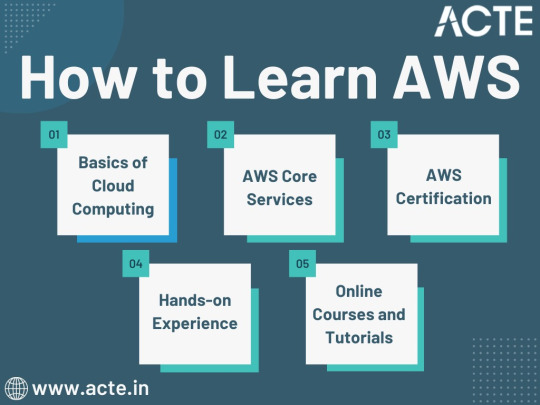
Amazon Web Services (AWS) represents an exciting frontier in the realm of cloud computing. As businesses and individuals increasingly rely on the cloud for innovation and scalability, AWS stands as a pivotal platform. The journey to AWS proficiency involves grasping fundamental cloud concepts, exploring core services, obtaining certifications, and acquiring practical experience. To expedite this process, online courses, tutorials, and structured training from renowned institutions like ACTE Technologies can be invaluable. ACTE Technologies' comprehensive AWS training programs provide hands-on experience, making your quest to master AWS more efficient and positioning you for a successful career in cloud technology.
8 notes
·
View notes
Text
Crafting a Career Odyssey: AWS Certification Unveiled for Solution Architects
Embarking on the journey of AWS certification as a Solution Architect unveils a plethora of career avenues, transforming your professional trajectory in the dynamic landscape of cloud computing. Let's explore the myriad paths that unfold for certified AWS Solution Architects:
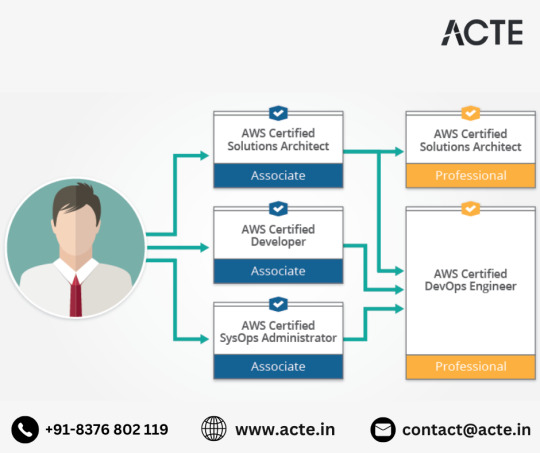
1. Architecting Excellence: Steering Digital Transformations AWS certification catapults you into roles where you architect and implement cutting-edge solutions. As a linchpin in digital transformations, you play a pivotal role in creating scalable, secure, and cost-effective solutions aligned with organizational objectives.
2. Cloud Architect Mastery: Orchestrating Comprehensive Cloud Strategies The journey doesn't stop at Solution Architect; it seamlessly transitions into broader Cloud Architect roles. Here, you orchestrate end-to-end cloud strategies, ensuring optimal performance, security, and efficiency in cloud-based environments.
3. Enterprise Architect Pinnacle: Shaping Holistic IT Strategies With AWS certification, the pathway extends to Enterprise Architect roles. This involves shaping the overarching IT strategy, aligning technology solutions with business goals, and ensuring seamless integration across the enterprise.
4. Cloud Consulting Expertise: Guiding Clients on Cloud Journey Organizations seek AWS-certified Solution Architects for Cloud Consultant positions, where you provide guidance on cloud strategies, migration plans, and optimize AWS infrastructure for enhanced performance.
5. Technical Leadership Zenith: Guiding Development Initiatives Expertise gained through AWS certification positions you favorably for technical leadership roles. Leading teams, guiding development projects, and offering strategic input on technology initiatives become part of your purview.
6. DevOps Alchemy: Bridging Development and Operations The fusion of AWS expertise and Solution Architect skills opens doors to DevOps Engineer opportunities. Your grasp of cloud infrastructure proves invaluable in optimizing continuous integration and deployment pipelines.
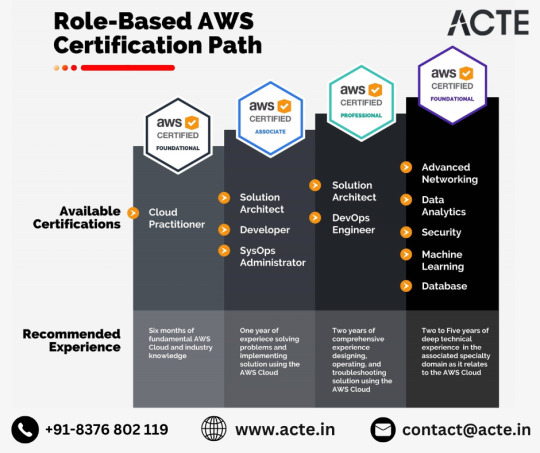
7. Pre-Sales Artistry: Crafting Compelling Solutions Leverage AWS certification in Pre-Sales Solutions Architect positions. Engaging with clients during the pre-sales phase, you become instrumental in understanding their needs and crafting compelling solutions.
8. Specialized Architectural Prowess: Exploring Niche Opportunities As technology evolves, specialized Solution Architect roles emerge. Depending on your interests and the evolving AWS service landscape, opportunities in areas like AI/ML architecture, IoT solutions, or serverless architectures beckon.
9. Entrepreneurial Odyssey: Beyond Conventional Paths Armed with AWS certification, entrepreneurial pursuits become viable. Whether offering specialized AWS services or launching a tech startup, the certification serves as a foundation for innovative endeavors.
10. Lifelong Learning Odyssey: Staying Ahead in the Dynamic AWS Realm The AWS ecosystem is dynamic, with constant updates and new services. Your certification journey becomes a springboard for continuous learning and professional development, ensuring you remain at the forefront of cloud technology.
In conclusion, AWS certification for Solution Architects is not just a validation; it's a compass guiding you through a rich tapestry of career possibilities. Whether crafting digital landscapes, steering enterprises through the cloud, or exploring niche opportunities, the certification becomes a catalyst for continuous growth, learning, and innovation in the ever-evolving cloud computing domain.
2 notes
·
View notes
Text
Navigating the Future as Azure Certifications in 2024
In the ever-evolving landscape of cloud technology, Azure certifications continue to be instrumental in shaping the careers of IT professionals and influencing the strategies of organizations worldwide. As we step into 2024, it's essential to explore the current trends, advancements, and the transformative impact that Azure certifications are poised to have in the coming year.
The Continued Relevance of Azure Certifications
Azure certifications are not mere credentials; they are gateways to expertise and recognition in the dynamic world of cloud computing. As businesses increasingly rely on cloud solutions, the demand for skilled Azure professionals continues to grow. In 2024, Azure certifications stand as key assets, ensuring that professionals possess the knowledge and skills needed to navigate the complexities of cloud technology effectively.
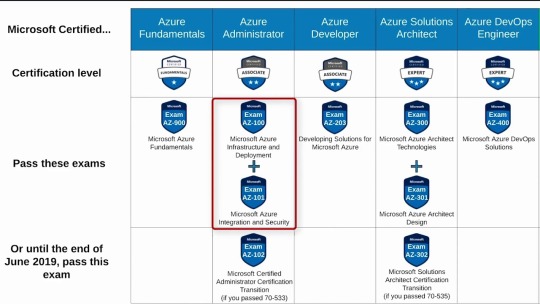
Azure Certification Paths in 2024
Azure certifications are structured into comprehensive paths, catering to individuals at various stages of their cloud journey. From foundational certifications for beginners to advanced tracks tailored for specialized roles like Azure Solutions Architect or Azure DevOps Engineer, the certification paths have evolved to align with the diverse needs of IT professionals. The year 2024 sees an increased focus on role-based certifications, allowing individuals to hone specific skills relevant to their job roles.
Key Benefits of Azure Certifications in 2024
Career Advancement:
Azure certifications are a proven catalyst for career growth. In 2024, as businesses seek skilled professionals, holding an Azure certification becomes a valuable asset for those aiming to advance their careers in cloud technology.
Industry Recognition:
Globally recognized, Azure certifications validate one's expertise in Microsoft's cloud services. Employers across industries acknowledge and value these certifications as a mark of proficiency in handling Azure-based solutions.
Continuous Learning Culture:
In 2024, Azure certifications are not just about achieving a one-time qualification; they embody a commitment to continuous learning. Microsoft regularly updates its certification paths to align with emerging technologies, encouraging professionals to stay abreast of the latest industry trends.
Increased Employability:
As the job market becomes more competitive, possessing Azure certifications enhances employability. In 2024, businesses are actively seeking candidates with practical Azure skills, making certification holders highly sought after.
Emerging Trends in Azure Certifications for 2024
Micro-Certifications:
2024 witnesses a rise in micro-certifications, focusing on specific, targeted skills. These bite-sized certifications allow professionals to demonstrate expertise in niche areas, providing a more granular approach to skill validation.
Scenario-Based Assessments:
Azure certification exams in 2024 are increasingly incorporating scenario-based questions. This shift aims to evaluate not just theoretical knowledge but the ability to apply that knowledge in practical, real-world situations.
Integration of AI and ML:
With the growing importance of artificial intelligence (AI) and machine learning (ML), Azure certifications in 2024 are placing a greater emphasis on these technologies. Certification tracks dedicated to AI and ML applications within Azure are gaining prominence.
Focus on Security:
In response to the heightened concern for cybersecurity, Azure certifications in 2024 place a significant focus on security-related tracks. Azure Security Engineer certifications are expected to be in high demand as organizations prioritize securing their cloud environments.
Tips for Success in Azure Certifications 2024
Stay Updated: Given the evolving nature of technology, staying updated with the latest Azure services and features is crucial. Regularly check Microsoft's official documentation and announcements for any updates.
Hands-On Experience: Practical experience is invaluable. Utilize Azure's sandbox environments, participate in real-world projects, and engage with the Azure portal to reinforce your theoretical knowledge.
Leverage Learning Resources: Microsoft provides a wealth of learning resources, including online courses, documentation, and practice exams. Take advantage of these resources to supplement your preparation.
Join the Azure Community: Engage with the Azure community through forums, webinars, and social media. Networking with professionals in the field can provide insights, tips, and support during your certification journey.
Conclusion
As we venture into 2024, Azure certifications stand as pivotal tools for IT professionals aiming to thrive in the dynamic world of cloud technology. Whether you are starting your journey with foundational certifications or advancing your skills with specialized tracks, Azure certifications in 2024 represent more than just qualifications – they symbolize a commitment to excellence, continuous learning, and a future shaped by innovation in the cloud. Embrace the opportunities, stay ahead of the curve, and let Azure certifications be your guide to success in the ever-evolving realm of cloud proficiency.

Frequently Asked Questions (FAQs)
What are the new Azure certifications introduced in 2024?
As of 2024, Microsoft has introduced several new certifications to align with emerging technologies. Notable additions include specialized tracks focusing on AI, ML, and advanced security.
How has the exam format changed for 2024?
The exam format in 2024 has evolved to include more scenario-based questions. This change is aimed at assessing practical application skills in addition to theoretical knowledge.
Are there any prerequisites for Azure certifications in 2024?
Prerequisites vary based on the specific certification. While some foundational certifications may have no prerequisites, advanced certifications often require prior experience or the completion of specific lower-level certifications.
Can I still take exams for older Azure certifications in 2024?
Microsoft often provides a transition period for older certifications, allowing candidates to complete them even as new certifications are introduced. However, it's advisable to check Microsoft's official documentation for specific details.
How frequently are Azure certifications updated?
Azure certifications are regularly updated to stay aligned with the latest technologies and industry trends. Microsoft recommends that candidates stay informed about updates through official communication channels.
4 notes
·
View notes
Text
Top Tools and Technologies Every Full Stack Java Developer Should Know
In today's fast-paced software development landscape, Full Stack Java Developers are in high demand. Companies seek professionals who can work across both the frontend and backend, manage databases, and understand deployment processes. Whether you're just starting your career or planning to upskill, mastering the right set of tools and technologies is key.
If you're considering a full stack java training in KPHB, this guide will help you understand the essential technologies and tools you should focus on to become industry-ready.

1. Java and Spring Framework
The foundation of full stack Java development starts with a deep understanding of Core Java and object-oriented programming concepts. Once you’ve nailed the basics, move to:
Spring Core
Spring Boot – simplifies microservices development.
Spring MVC – for building web applications.
Spring Security – for handling authentication and authorization.
Spring Data JPA – for database operations.
Spring Boot is the most widely adopted framework for backend development in enterprise applications.
2. Frontend Technologies
A full stack Java developer must be proficient in creating responsive and interactive UIs. Core frontend technologies include:
HTML5 / CSS3 / JavaScript
Bootstrap – for responsive designs.
React.js or Angular – for building dynamic SPAs (Single Page Applications).
TypeScript – especially useful when working with Angular.
3. Database Management
You’ll need to work with both relational and non-relational databases:
MySQL / PostgreSQL – popular SQL databases.
MongoDB – a widely used NoSQL database.
Hibernate ORM – simplifies database interaction in Java.
4. Version Control and Collaboration
Version control systems are crucial for working in teams and managing code history:
Git – the most essential tool for source control.
GitHub / GitLab / Bitbucket – platforms for repository hosting and collaboration.
5. DevOps and Deployment Tools
Understanding basic DevOps is vital for modern full stack roles:
Docker – for containerizing applications.
Jenkins – for continuous integration and delivery.
Maven / Gradle – for project build and dependency management.
AWS / Azure – cloud platforms for hosting full stack applications.
6. API Development and Testing
Full stack developers should know how to develop and consume APIs:
RESTful API – commonly used for client-server communication.
Postman – for testing APIs.
Swagger – for API documentation.
7. Unit Testing Frameworks
Testing is crucial for bug-free code. Key testing tools include:
JUnit – for unit testing Java code.
Mockito – for mocking dependencies in tests.
Selenium / Playwright – for automated UI testing.
8. Project Management and Communication
Agile and collaboration tools help manage tasks and teamwork:
JIRA / Trello – for task and sprint management.
Slack / Microsoft Teams – for communication.
Final Thoughts
Learning these tools and technologies can position you as a highly capable Full Stack Java Developer. If you're serious about a career in this field, structured learning can make all the difference.
Looking for expert-led Full Stack Java Training in KPHB? ✅ Get industry-ready with hands-on projects. ✅ Learn from experienced instructors. ✅ Job assistance and certification included.
👉 Visit our website to explore course details, check out FAQs, and kickstart your journey today!
0 notes
Text
Invisible Brilliance: The Quiet Power of Full Stack Development
In the ever-evolving world of technology, enrolling in the Best Java Certification Course in Pune is often the first step toward unlocking bigger opportunities—especially in the field of full stack development. While this domain may not always grab headlines, it forms the foundation of nearly every digital experience we rely on daily.
From the interfaces we interact with to the servers working behind the scenes, full stack development ensures seamless functionality, security, and performance. It’s a quiet power—an invisible brilliance—that is transforming industries globally.
Let’s explore why this skillset is becoming non-negotiable for developers and how mastering Java and full stack technologies is paving the way for future-ready careers.
What is Full Stack Development?
Full stack development is the ability to work on both the frontend (user interface) and backend (server-side logic and databases) of an application. It’s not just about knowing multiple languages—it’s about understanding how every component of a system works together.
A full stack developer acts as the bridge between visual design and functional infrastructure. Their knowledge spans the entire tech stack, allowing them to troubleshoot, build, and scale complete web applications from scratch.
Why Full Stack Developers Are in Demand
With lean teams and rapid project timelines becoming the norm, companies are turning to full stack developers who can handle multiple responsibilities efficiently. From startups to tech giants, organizations prefer professionals who can see the big picture and work across disciplines.
The value of full stack expertise lies in:
Flexibility: Work across design, development, and deployment stages.
Efficiency: Speed up project timelines by reducing dependencies.
Cost-effectiveness: One person managing multiple layers of the stack.
Stronger Collaboration: Communicate better with designers, QA teams, and DevOps.
The Role of Java in Full Stack Development
Though full stack development involves several languages and frameworks, Java continues to be a staple—especially for backend development. Its security, scalability, and cross-platform compatibility make it an essential tool for building robust server-side applications.
If you're aiming to build a serious career in tech, choosing the Best Java Certification Course in Pune gives you more than syntax knowledge. It trains you in building APIs, handling data securely, integrating databases, and deploying enterprise-level applications.
Pune: A Growing Hub for Full Stack Education
Over the past few years, Pune has emerged as a technology and education hub. It houses numerous training institutes offering high-quality programs tailored to modern industry needs.
If you're looking for the Best Full Stack Course in Pune, this city offers a range of options with hands-on experience, real-time projects, and placement support. Many of these programs integrate Java, React, Node.js, MongoDB, and DevOps tools, preparing students to step confidently into development roles.
What to Look for in a Full Stack Course
It’s easy to get overwhelmed by the number of options available. But not every course delivers the depth and quality required to become job-ready.
When choosing a full stack course, consider the following:
Updated Curriculum: Includes latest tools like React, Node.js, Express, and MongoDB.
Backend Strength: Strong emphasis on core technologies like Java and Spring Boot.
Real-world Projects: Work on live assignments to build confidence.
Placement Support: Resume building, mock interviews, and job referrals.
Expert Trainers: Learn from professionals who have industry experience.
Courses that integrate Java into full stack development give students a major advantage—combining the power of one of the most trusted backend languages with modern frontend frameworks.
Benefits of Java-Centric Full Stack Training
One of the biggest advantages of Java-based training is its versatility. Whether you're building a web application, mobile app backend, or enterprise software, Java remains highly relevant.
Benefits include:
Wide industry usage in banking, healthcare, and government projects
Rich ecosystem with Spring, Hibernate, and Maven
Strong community support and job availability
High-performance applications suitable for scaling
By beginning with the Best Java Certification Course in Pune, learners can then smoothly transition into full stack training that covers everything from frontend development to cloud deployment.
The Invisible Brilliance of Full Stack Development
The magic of full stack development is that it’s rarely noticed when it’s done right. Yet it’s responsible for the smooth functionality of platforms like Amazon, Netflix, and LinkedIn.
The invisible brilliance lies in seamlessly blending the user interface with secure and scalable backend systems. This is why top courses, including the Best Full Stack Course in Pune, are designed to build holistic problem-solvers—not just coders.
Conclusion: Build Beyond the Basics
Becoming a full stack developer is not just about learning multiple languages—it’s about building a mindset of adaptability, creativity, and system-wide thinking.
For anyone looking to future-proof their career in tech, starting with the Best Java Certification Course in Pune is a smart move. It forms the backbone of backend development, which, when combined with modern frontend and DevOps skills, creates a full stack powerhouse.
If you're serious about coding, application development, or launching your own digital product, enrolling in the Best Full Stack Course in Pune could be the most valuable investment you make.
Because in the end, the real brilliance doesn’t shout—it works quietly, powering the digital world behind the scenes.
0 notes
Text
Kickstart Your Cloud Journey with AWS Training in Pune
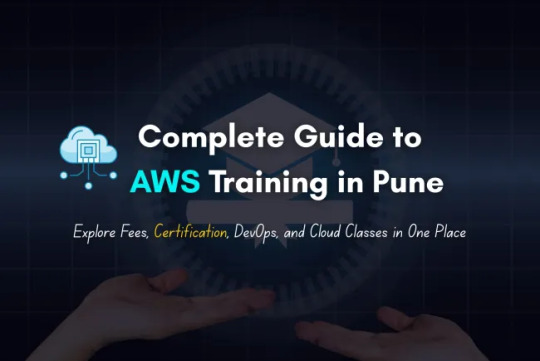
Cloud computing is reshaping the way organizations operate—and at the heart of this revolution is Amazon Web Services (AWS). If you're looking to build a future-proof career in cloud technology, enrolling in AWS Cloud Training in Pune is your first step toward success. With expert mentorship and hands-on training, WebAsha Technologies helps you gain the skills needed to thrive in today’s cloud-driven job market.
Why AWS Skills Are Essential and Beyond
Amazon Web Services (AWS) leads the cloud services industry, offering over 200 fully featured services for computing, storage, database, machine learning, and more. As cloud adoption accelerates across sectors, the demand for skilled AWS professionals continues to grow.
Top Benefits of Learning AWS:
High-paying job opportunities
Versatile roles across industries
Scalable skills for modern IT careers
Foundation for DevOps and cloud-native development
Why Choose WebAsha Technologies for AWS Training Programs in Pune?
At WebAsha Technologies, we are committed to turning learners into cloud professionals. Our AWS Cloud Training in Pune is designed for both beginners and working professionals who want to upskill or transition into cloud computing.
Key Features of Our AWS Training:
Certified and Experienced Instructors
Hands-on Practice with Real-Time Projects
Dedicated Lab Access for Cloud Experiments
Updated Curriculum Aligned with AWS Certification Tracks
Placement Support and Career Guidance
Who Should Enroll in AWS Cloud Training?
Our AWS programs are suitable for:
Fresh Graduates aspiring to enter the IT sector
IT Professionals looking to upgrade their skills
System Admins and Network Engineers
Software Developers and DevOps Engineers
Entrepreneurs planning to deploy scalable applications
What You Will Learn in the AWS Training Program
Our training covers everything you need to become cloud-ready and certification-ready.
Course Modules Include:
Introduction to Cloud Computing & AWS Overview
EC2, S3, and EBS – AWS Compute and Storage Services
VPC, Subnetting, and Network Security
IAM – Identity and Access Management
Elastic Load Balancer & Auto Scaling
RDS, DynamoDB – Database Services
CloudFormation, CloudWatch & Billing
Serverless Computing with AWS Lambda
Practice Tests & Real-Time Case Studies
Career Outcomes After AWS Training
After completing your training with us, you'll be prepared to pursue certifications like:
AWS Certified Cloud Practitioner
AWS Certified Solutions Architect – Associate
AWS Certified Developer – Associate
AWS Certified DevOps Engineer – Professional
Conclusion: Begin Your AWS Cloud Journey with Confidence
Don’t wait for opportunities—create them by building cloud expertise. The AWS Cloud Training in Pune by WebAsha Technologies is your launchpad into one of the most in-demand fields in the world. With expert trainers, real-world projects, and career support, you’ll be fully equipped to succeed in today’s competitive tech landscape.
0 notes
Text
Master the Code: How Java, Python, and Web Development Tutoring on MentorForHire Can Supercharge Your Tech Career
In a world powered by software, coding is no longer just a niche skill—it's a core competency. Whether you're looking to break into tech, ace a coding bootcamp, land your first junior developer job, or scale your expertise as a senior engineer, personalized mentoring makes a dramatic difference. That’s where MentorForHire.com comes in—a platform that connects you with industry professionals for hands-on Java Tutoring, Python Tutoring, and Web Development Tutoring.
Here’s how specialized tutoring in these key areas can accelerate your learning journey and help you achieve your software development goals.
Why One-on-One Coding Tutoring Beats Generic Online Courses
Self-paced tutorials and free courses are great for dipping your toes in—but when you're serious about growth, they often fall short. Why?
You don’t know what you don’t know.
Debugging can become a time-wasting nightmare.
Without accountability, progress slows down.
You’re not getting job-ready feedback from a real developer.
MentorForHire solves all of these problems by connecting you with real mentors who’ve worked in tech and know what it takes to succeed. Whether you're working on a class assignment, preparing for interviews, or building a full-stack project, you'll get tailored support.
Java Tutoring: Build Enterprise-Grade Skills from the Ground Up
Java isn’t just for beginners—it powers billions of devices, from Android apps to massive backend systems used in finance, healthcare, and e-commerce. If you're serious about software engineering, Java Tutoring offers a rock-solid foundation.
With a mentor, you can:
Understand core concepts like classes, inheritance, interfaces, and exception handling.
Master data structures and algorithms for whiteboard interviews.
Build scalable applications using Java frameworks like Spring and Hibernate.
Get help with unit testing, debugging, and version control.
Prepare for certifications like Oracle Certified Associate (OCA) and Oracle Certified Professional (OCP).
A mentor will not only explain the "how" of Java development but also the "why"—turning you from a coder into a software architect-in-training.
Python Tutoring: The Most Versatile Language in Tech
Python has become the go-to language for beginners and professionals alike because of its simplicity and power. Whether you want to get into automation, data science, machine learning, or back-end web development, Python Tutoring gives you the skills you need to thrive.
On MentorForHire.com, Python mentors can help you:
Write clean, efficient, and maintainable code.
Understand essential concepts like functions, loops, list comprehensions, and file I/O.
Use libraries like NumPy, pandas, Matplotlib, and scikit-learn for data analysis.
Build web apps with Flask or Django from scratch.
Automate tasks using Python scripts or integrate with APIs.
Whether you're solving LeetCode challenges or working on a startup prototype, personalized tutoring can take your Python skills to the next level.
Web Development Tutoring: Learn to Build the Web, Not Just Consume It
Today’s digital economy is built on the web—and web developers are in high demand across every industry. But with so many tools and frameworks, it’s easy to get overwhelmed. That’s where Web Development Tutoring comes in.
From front-end to back-end to full-stack, tutors on MentorForHire.com can guide you step-by-step:
Front-End Skills:
HTML, CSS, and JavaScript fundamentals
Responsive design using Flexbox and Grid
JavaScript frameworks like React, Angular, or Vue
Version control with Git and GitHub
Back-End Skills:
Node.js with Express or Java with Spring Boot
REST APIs and database integration (MySQL, MongoDB)
Authentication systems (OAuth, JWT)
DevOps basics: deploying apps with Heroku or AWS
You’ll work on actual projects like to-do lists, dashboards, or e-commerce stores—and get expert feedback every step of the way.
How MentorForHire Makes Learning Easier and Smarter
MentorForHire.com isn't just about hiring a tutor—it's about mentorship. The platform matches you with experienced developers who offer:
Flexible scheduling – Learn when it suits your life.
Customized roadmaps – No more cookie-cutter syllabi.
Real-world projects – Build apps that solve actual problems.
Code reviews & interview prep – Gain confidence before job applications.
Ongoing support – Whether it’s bugs, burnout, or breakthroughs.
This isn’t a YouTube tutorial or a lecture—it’s a partnership. Whether you're 16 or 60, learning to code becomes faster and more meaningful when you have someone guiding you in real time.
Who Is This For?
Students who want to stand out in their CS classes
Career changers entering tech from another field
Bootcamp grads who need more 1:1 help
Junior developers looking to climb the ladder
Entrepreneurs building their own software products
If you’ve got a goal and a laptop, MentorForHire.com has a mentor ready to help you reach it.
Final Thoughts: The Future Belongs to Lifelong Learners
The best investment you can make is in yourself. Whether you're learning Java, diving into Python, or building full-stack web apps, tutoring turns passive learning into active progress.
MentorForHire.com helps unlock your potential by giving you access to mentors who’ve been where you are—and know how to help you level up.
So why wait? Start your personalized tutoring journey today. Visit MentorForHire and connect with a mentor who can help you write your success story in code.
0 notes
Text
Master the Recipe for Success: DevOps Training to Fuel Innovation and Growth
In today's technology-driven world, businesses across industries are constantly striving to enhance their operations and stay ahead of the competition. Successful companies understand that innovation and growth go hand in hand, and one key ingredient in this recipe for success is DevOps training. By investing in DevOps education and information technology (IT), organizations can equip their teams with the necessary skills and knowledge to streamline development processes, promote collaboration, and drive efficiency. This article explores the significance of DevOps training and how it can fuel innovation and growth within an organization.
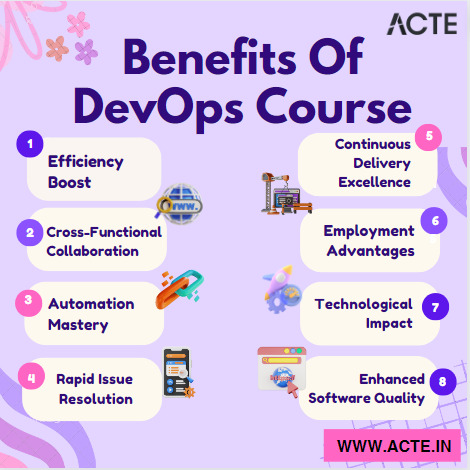
The Advantages of DevOps Training
DevOps training offers numerous benefits to organizations seeking to optimize their development lifecycle and foster a culture of innovation. Here are some advantages associated with investing in DevOps education:
Enhanced Collaboration: DevOps training promotes a collaborative mindset by breaking down silos between development and operations teams. Through cross-functional training, individuals gain a deeper understanding of each other's roles, fostering communication and cooperation.
Streamlined Development Processes: With a strong DevOps foundation, businesses can streamline their development processes by implementing automation, continuous integration, and continuous delivery (CI/CD) practices. These streamlined processes reduce bottlenecks, minimize errors, and accelerate time-to-market.
Improved Efficiency and Productivity: By equipping employees with the necessary skills to effectively utilize DevOps tools and techniques, organizations can dramatically enhance efficiency and productivity. Training empowers team members to leverage automation tools, optimize workflows, and reduce manual effort.
Better Quality and Reliability: Through DevOps education, individuals gain expertise in implementing robust testing practices and quality assurance techniques. This results in improved software reliability, minimal downtime, and enhanced customer satisfaction.
Exploring DevOps Training Options
When considering DevOps training, organizations have a range of options to choose from. These options cater to diverse learning preferences and can be tailored to meet specific business needs. Here are some popular DevOps training choices:
1. Instructor-Led Training
Instructor-led training programs offer a structured approach to learning, combining theoretical concepts with hands-on exercises. Students benefit from real-time interaction with experienced instructors and fellow learners, fostering a deeper understanding of DevOps principles and best practices.
2. Online Courses
Online courses provide flexibility and convenience for individuals seeking to acquire DevOps skills at their own pace. These courses often consist of pre-recorded videos, interactive quizzes, and comprehensive learning materials. Students can access the content anytime, anywhere, making it ideal for busy professionals.
3. Certifications
Obtaining a recognized DevOps certification can be a valuable asset for career advancement and professional growth. Certifications validate an individual's expertise in DevOps methodologies and tools, instilling confidence in employers and clients alike. Several reputable organizations offer DevOps certifications, such as the DevOps Institute and Amazon Web Services.
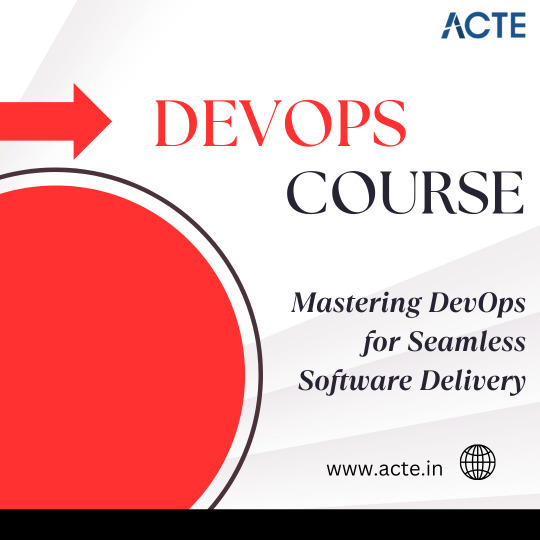
The Role of IT in DevOps Training
Information technology plays a pivotal role in enabling successful DevOps training initiatives. IT teams act as facilitators, providing the necessary infrastructure, tools, and resources to support training efforts. Here are essential aspects of IT's involvement:
Provision of Training Environments: IT departments ensure the availability of training environments, such as virtual machines or cloud-based labs, where learners can practice deploying software, configuring systems, and working with various DevOps tools.
Management of Training Platforms: IT teams oversee and maintain the learning platforms used for delivering DevOps training. This involves ensuring proper access control, monitoring system performance, and troubleshooting any technical issues that may arise.
Support for Tool Adoption: IT professionals assist in the adoption and integration of DevOps tools into existing systems. This includes providing guidance on tool selection, configuration, and customization to align with an organization's unique requirements.
Security and Compliance Considerations: IT personnel play a crucial role in ensuring that all training activities align with security policies and compliance regulations. They implement measures to protect sensitive data, secure communication channels, and maintain the integrity of training environments.
DevOps training serves as a catalyst for innovation and growth within organizations by fostering collaboration, streamlining development processes, improving efficiency, and promoting quality. By investing in ACTE institute DevOps training options, businesses can equip their teams with the knowledge and skills needed to adapt and thrive in an ever-evolving digital landscape. With the crucial support of information technology, organizations can maximize the potential of DevOps training and embark on a path towards sustained success.
9 notes
·
View notes
Text
How Poscig Technologies Builds Fast, Secure, and Scalable Websites for Any Business

In the digital age, a website is more than just a business card it’s the foundation of your online presence. But for it to truly deliver results, it must be fast, secure, and scalable. This is where expert-level web development services come into play.
At Poscig Technologies, we go beyond aesthetics. As a leading web development company in Pune, India, we help businesses build performance-driven websites that are built to convert, scale, and protect.
Here’s how we ensure our clients stay ahead in the digital game.
Why Website Speed Matters?
Website visitors today expect lightning-fast experiences. Research shows that a 1-second delay in page load time can cut conversions by 7%, and over half of users abandon sites that take more than 3 seconds to load.
Speed also plays a major role in Google’s Core Web Vitals a key SEO ranking factor.
At Poscig Technologies, our web development services include:
Writing clean, minimal, and SEO-friendly code
Image compression techniques to reduce load time
Integration of global Content Delivery Networks (CDNs)
This ensures every website we build loads quickly, ranks well, and keeps users engaged.
Building Secure Websites
In today’s threat landscape, security isn’t optional — it’s critical. As a trusted provider of web development services in Pune, India, we embed security into every layer of your website’s architecture.
Here’s what we implement:
SSL certificates for secure data encryption
Secure frameworks like Laravel and Next.js
Regular vulnerability scans and code audits
Role-based access controls and authentication systems
Our goal? To ensure your business is protected from data breaches, phishing, and malware.

Scalable Architecture for Future Growth
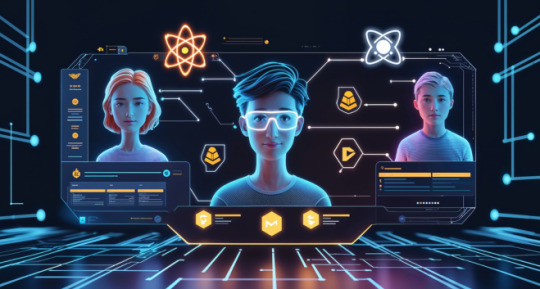
As your business grows, so should your website — without the need to rebuild it from scratch.
At Poscig Technologies, we specialize in scalable web development services. Our approach includes:
Modular and component-based coding
Optimized database structures
Cloud-based deployments using AWS, DigitalOcean, and more
Tech Stack and Tools That Power Our Success
To deliver top-tier solutions, we rely on the most modern and secure tools available:
Frontend: React, Next.js, Vue.js
Backend: Laravel, Node.js
Deployment Platforms: AWS, DigitalOcean, Vercel
DevOps: CI/CD pipelines for smooth updates and no downtime
This stack allows us to offer web development services that are not just high-performing, but also easy to maintain and expand.

Why Businesses Choose Poscig Technologies

Working with a best design company like Poscig Technologies means getting more than just a website — you get a digital platform built to grow and evolve with your business.
Faster websites increase engagement and drive conversions
Secure platforms reduce risk and build trust
Scalable solutions future-proof your online presence
Conclusion
In a world where digital expectations are constantly rising, having a visually attractive website is just the beginning. The real value lies in building a website that is fast, secure, and scalable — and that’s exactly what we do at Poscig Technologies.
If you’re looking for web development services in Pune, India, and want to work with a best design company that understands performance, security, and growth — we’re here to help.

#software development company in india#top software development companies#ai ml development company#business intelligence services#mobile app development company in pune#web development company in pune#cyber security services in pune#staff augmentation company in pune#website development company in pune##android app development company#cyber security management services#wordpress website development services#custom software development services
0 notes
Text
Full Stack Training
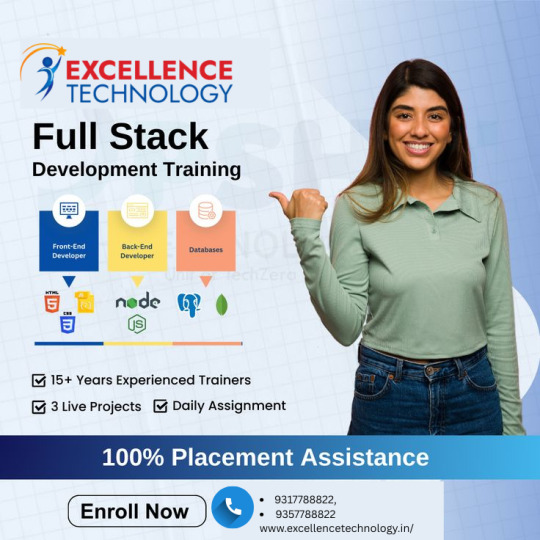
How Can Full Stacking Training Boost Your Skills?
In today’s fast-paced digital world, full stack training is more essential than ever. Businesses seek skilled developers who can handle both front-end and back-end development tasks. Whether you're a beginner or someone looking to upgrade your skill set, full stack training offers the knowledge needed to thrive in tech.
What Is Full Stack Training?
Full stack training teaches you how to build and manage both the client-side (front-end) and server-side (back-end) of web applications. This training covers essential languages, frameworks, and tools used to develop complete, scalable web applications.
Why Choose Full Stack Training?
There are several reasons why full stack development is a preferred path:
High Demand: Full stack developers are in high demand across industries.
Versatility: You can handle projects from start to finish.
Lucrative Salary: Full stack professionals earn competitive salaries globally.
Flexibility: Work as a freelancer, startup founder, or part of a corporate team.
By enrolling in full stack training, you're investing in a skill set that can lead to countless career opportunities.
Key Components of Full Stack Training
To become a successful full stack developer, you must understand both front-end and back-end technologies. Let’s break it down.
1. Front-End Development
The front-end is what users see and interact with on a website.
HTML: The foundation of any web page.
CSS: Used to style HTML content.
JavaScript: Adds interactivity and functionality to web pages.
Frameworks: React, Angular, or Vue.js for building dynamic user interfaces.
2. Back-End Development
The back-end manages databases, servers, and application logic.
Programming Languages: Node.js, Python, PHP, Java, or Ruby.
Databases: SQL (MySQL, PostgreSQL) and NoSQL (MongoDB).
APIs: Create and manage RESTful APIs for data exchange.
Server Management: Handling server setup, security, and performance optimization.
3. Version Control Systems
Git & GitHub: Essential for collaboration and code management.
4. Deployment and Hosting
Learn how to deploy apps using:
Heroku
Netlify
AWS or Azure
By mastering all these elements through full stack training, you'll be ready to tackle any web development project.
What to Look for in a Full Stack Training Program
Not all full stack training courses are created equal. Here’s what to look for:
1. Comprehensive Curriculum
Choose a program that covers both front-end and back-end development, version control, deployment, and best coding practices.
2. Hands-On Projects
Practice is key. Look for training with real-world projects and assignments.
3. Expert Instructors
Experienced mentors can make complex topics easy to understand.
4. Certification
A recognized certificate can boost your credibility with employers.
Benefits of Full Stack Training
Still wondering why you should enroll in a full stack course? Here are some unbeatable benefits:
1. Accelerated Learning Path
Full stack training condenses years of knowledge into a structured, easy-to-follow format.
2. Career Flexibility
You can work in various roles such as:
Web Developer
Software Engineer
DevOps Specialist
Technical Project Manager
3. Job-Ready Skills
You’ll be prepared for real-world jobs with a strong portfolio of projects.
4. Freelance and Remote Work Opportunities
Mastering full stack development gives you the freedom to work from anywhere.
Full Stack Developer Salary Expectations
After completing full stack training, your earning potential significantly increases. In the US, entry-level full stack developers earn between $60,000 and $90,000 per year. Experienced professionals can earn well over $120,000 annually.
Freelancers often charge between $30 to $100 per hour, depending on skill and experience.
Online vs Offline Full Stack Training
Online Training
Flexible schedule
Affordable
Global access to top instructors
Offline Training
In-person interaction
Structured environment
Local networking opportunities
Choose the option that best fits your learning style and lifestyle.
Tools You’ll Learn in Full Stack Training
Here are some essential tools commonly taught in full stack programs:
VS Code (Code Editor)
Postman (API Testing)
Docker (Containerization)
Jira (Project Management)
Webpack (Module Bundler)
Conclusion: Start Your Full Stack Journey Today
Full stack training equips you with the tools, technologies, and confidence to become a complete web developer. Whether you're just starting or want to level up your career, the right training program can open doors to numerous job roles and freelance opportunities.
By investing in your education through full stack training, you gain job security, career growth, and the flexibility to shape your professional path.
1 note
·
View note
Text
DevOps for Mobile: CI/CD Tools Every Flutter/React Native Dev Needs

Does shipping a new version of your mobile app feel like orchestrating a mammoth undertaking, prone to late nights, manual errors, and stressed-out developers? You're not alone. Many teams building with flexible frameworks like Flutter and React Native grapple with antiquated, laborious release processes. The dynamic landscape of mobile demands agility, speed, and unwavering quality – traits often antithetical to manual builds, testing, and deployment. Bridging this gap requires a dedicated approach: DevOps for Mobile. And central to that approach are robust CI/CD tools.
The Bottlenecks in Mobile App Delivery
Mobile application programming inherently carries complexity. Multiple platforms (iOS and Android), diverse device types, intricate testing matrices, app store submission hurdles, and the constant churn of framework and SDK updates contribute to a multifaceted environment. Without disciplined processes, delivering a high-quality, stable application with consistent velocity becomes a significant challenge.
Common Pitfalls Hindering Release Speed
Often, teams find themselves wrestling with several recurring issues that sabotage their release pipelines:
Manual Builds and Testing: Relying on developers to manually build app binaries for each platform is not only time-consuming but also highly susceptible to inconsistencies. Did you use the right signing certificate? Was the correct environment variable set? Manual testing on devices adds another layer of potential omission and delays.
Code Integration Nightmares: When multiple developers merge their code infrequently, the integration phase can devolve into a stressful period of resolving complex conflicts, often introducing unexpected bugs.
Inconsistent Environments: The "it works on my machine" syndrome is pervasive. Differences in SDK versions, build tools, or operating systems between developer machines and build servers lead to unpredictable outcomes.
Lack of Automated Feedback: Without automated testing and analysis, issues like code quality degradation, performance regressions, or critical bugs might only be discovered late in the development cycle, making them expensive and time-consuming to fix.
Laborious Deployment Procedures: Getting a mobile app from a built binary onto beta testers' devices or into the app stores often involves numerous manual steps – uploading artifacts, filling out metadata, managing releases. This is boring work ripe for automation and error.
The aggregate effect of these bottlenecks is a slow, unpredictable release cycle, preventing teams from iterating quickly based on user feedback and market demands. It's a recalcitrant problem needing a systemic resolution.
What DevOps for Mobile Truly Means
DevOps for Mobile applies the foundational principles of the broader DevOps philosophy – collaboration, automation, continuous improvement – specifically to the mobile development lifecycle. It's about fostering a culture where development and operations aspects (though mobile operations are different from traditional server ops) work seamlessly.
Shifting Left and Automation Imperative
A core tenet is "shifting left" – identifying and resolving problems as early as possible in the pipeline. Catching a build issue during commit is vastly preferable to discovering it hours later during manual testing, or worse, after deployment. This early detection is overwhelmingly facilitated by automation. Automation is not merely a convenience in DevOps for Mobile; it's an imperative. From automated code analysis and testing to automated building and distribution, machinery handles the repetitive, error-prone tasks. This frees up developers to focus on writing features and solving complex problems, simultaneously enhancing the speed, reliability, and quality of releases. As an observed pattern, teams that prioritize this shift typically exhibit higher morale and deliver better software.
Core Components of Mobile App Development Automation
Building an effective DevOps for Mobile pipeline, especially for Flutter or React Native apps, centers around implementing Continuous Integration (CI) and Continuous Delivery/Deployment (CD).
The CI/CD Tools Spectrum
Continuous Integration (CI): Every time a developer commits code to a shared repository, an automated process triggers a build. This build compiles the code, runs unit and integration tests, performs static code analysis, and potentially other checks. The goal is to detect integration problems immediately. A failed build means someone broke something, and the automated feedback loop notifies the team instantly.
Continuous Delivery (CD): Building on CI, this process automatically prepares the app for release after a successful build and testing phase. This could involve signing the application, packaging it, and making it available in a repository or artifact store, ready for manual deployment to staging or production environments.
Continuous Deployment (CD): The next evolution of CD. If all automated tests pass and other quality gates are met, the application is automatically deployed directly to production (e.g., app stores or internal distribution). This requires a high level of confidence in your automated testing and monitoring.
Implementing these components requires selecting the right CI/CD tools that understand the nuances of building for iOS and Android using Flutter and React Native.
Essential CI/CD Tools for Flutter & React Native Devs
The ecosystem of CI/CD tools is extensive, ranging from versatile, self-hosted platforms to specialized cloud-based mobile solutions. Choosing the right ones depends on team size, budget, technical expertise, and specific needs.
Picking the Right Platforms
Several platforms stand out for their capabilities in handling mobile CI/CD:
Jenkins: A venerable, open-source automation server. It's highly extensible via a myriad of plugins, offering immense flexibility. However, setting up mobile builds, especially on macOS agents for iOS, can be complex and require substantial configuration and maintenance effort.
GitLab CI/CD: Integrated directly into GitLab repositories, this offers a compelling, unified platform experience. Configuration is via a `.gitlab-ci.yml` file, making it part of the code repository itself. It's robust but also requires managing runners (build agents), including macOS ones.
GitHub Actions: Tightly integrated with GitHub repositories, Actions use YAML workflows (`.github/workflows`) to define automation pipelines. It provides hosted runners for Linux, Windows, and macOS, making iOS builds simpler out-of-the-box compared to purely self-hosted options. It's become a ubiquitous choice for projects hosted on GitHub.
Bitrise: A cloud-based CI/CD specifically designed for mobile apps. Bitrise offers pre-configured build steps (called "Workflows") and integrations tailored for iOS, Android, Flutter, React Native, and more. This specialization greatly simplifies setup and configuration, though it comes as a managed service with associated costs.
AppCenter (Microsoft): Provides integrated CI/CD, testing, distribution, and analytics for mobile apps, including React Native and Flutter support (though Flutter support might be through specific configurations). It aims for a comprehensive mobile development platform experience.
Fastlane: While not a CI server itself, Fastlane is an open-source toolset written in Ruby that simplifies cumbersome iOS and Android deployment tasks (like managing signing, taking screenshots, uploading to stores). It's almost an indispensable complement to any mobile CI system, as the CI server can invoke Fastlane commands to handle complex distribution steps.
The selection often boils down to the build environment you need (especially macOS for iOS), the required level of customization, integration with your existing VCS, and whether you prefer a managed service or self-hosting.
Specific Flutter CI/CD Considerations
Flutter projects require the Flutter SDK to be present on the build agents. Both iOS and Android builds originate from the single Flutter codebase.
Setup: The CI system needs access to the Flutter SDK. Some platforms, like Bitrise, have steps explicitly for this. On Jenkins/GitLab/GitHub Actions, you'll need a step to set up the Flutter environment (often using tools like `flutter doctor`).
Platform-Specific Builds: Within the CI pipeline, you'll trigger commands like `flutter build ios` and `flutter build apk` or `flutter build appbundle`.
Testing: `flutter test` should run unit and widget tests. You might need device/emulator setups or cloud testing services (like Firebase Test Lab, Sauce Labs, BrowserStack) for integration/end-to-end tests, though this adds complexity.
Signing: Signing both Android APKs/App Bundles and iOS IPAs is crucial and requires careful management of keystores and provisioning profiles on the CI server. Fastlane is particularly useful here for iOS signing complexity management.
Teams observed grappling with Flutter CI/CD often struggle most with the iOS signing process on CI platforms.
Specific React Native CI/CD Considerations
React Native projects involve native build tools (Xcode for iOS, Gradle for Android) in addition to Node.js and yarn/npm for the JavaScript parts.
Setup: The build agent needs Node.js, npm/yarn, Android SDK tools, and Xcode (on macOS). NVM (Node Version Manager) or similar tools are helpful for managing Node versions on the build agent.
Platform-Specific Steps: The CI pipeline will have distinct steps for Android (`./gradlew assembleRelease` or `bundleRelease`) and iOS (`xcodebuild archive` and `xcodebuild exportArchive`).
Dependencies: Ensure npm/yarn dependencies (`yarn install` or `npm install`) and CocoaPods dependencies for iOS (`pod install` from within the `ios` directory) are handled by the pipeline before the native build steps.
Testing: Jest is common for unit tests. Detox or Appium are popular for end-to-end testing, often requiring dedicated testing infrastructure or cloud services.
Signing: Similar to Flutter, secure management of signing credentials (Android keystores, iOS certificates/profiles) is essential on the CI server. Fastlane is highly relevant for React Native iOS as well.
Based on project analysis, React Native CI/CD complexity often arises from the interaction between the JavaScript/Node layer and the native build processes, particularly dependency management (`node_modules`, CocoaPods) and environmental differences.
Implementing a Robust Mobile CI/CD Pipeline
Building your Mobile App Development Automation pipeline is not a weekend project. It requires deliberate steps and iteration.
Phased Approach to Adoption
Approaching CI/CD implementation incrementally yields better results and less disruption.
Phase One: Code Quality and Basic CI
Set up automated linters (e.g., ESLint/Prettier for React Native, `flutter analyze` for Flutter).
Configure CI to run these linters on every push or pull request. Fail the build on lint errors.
Integrate unit and widget tests into the CI build process. Fail the build on test failures. This is your foundational CI.
Phase Two: Automated Building and Artifacts
Extend the CI process to automatically build unsigned Android APK/App Bundle and iOS IPA artifacts on successful commits to main/develop branches.
Store these artifacts securely (e.g., S3, built-in CI artifact storage).
Focus on ensuring the build environment is stable and consistent.
Phase Three: Signing and Internal Distribution (CD)
Securely manage signing credentials on your CI platform (using secrets management).
Automate the signing of Android and iOS artifacts.
Automate distribution to internal testers or staging environments (e.g., using Firebase App Distribution, HockeyApp/AppCenter, TestFlight). This is where Fastlane becomes exceedingly helpful.
Phase Four: Automated Testing Enhancement
Integrate automated UI/integration/end-to-end tests (e.g., Detox, Appium) into your pipeline, running on emulators/simulators or device farms. Make passing these tests a mandatory step for deployment.
Consider performance tests or security scans if applicable.
Phase Five: App Store Distribution (Advanced CD/CD)
Automate the process of uploading signed builds to the Apple App Store Connect and Google Play Console using tools like Fastlane or platform-specific integrations.
Start with automating beta releases to app stores.
Move towards automating production releases cautiously, building confidence in your automated tests and monitoring.
Integrating Testing and Code Signing
These two elements are pragmatic pillars of trust in your automated pipeline.
Testing: Automated tests at various levels (unit, integration, UI, E2E) are your primary quality gate. No pipeline step should proceed without relevant tests passing. This reduces the likelihood of bugs reaching users. Integrate code coverage tools into your CI to monitor test effectiveness.
Code Signing: This is non-negotiable for distributing mobile apps. Your CI system must handle the complexities of managing and applying signing identities securely. Using features like secret variables on your CI platform to store certificates, keys, and keystore passwords is essential. Avoid hardcoding credentials.
Adopting a systematic approach, starting simple and progressively adding complexity and automation, is the recommended trajectory.
Common Errors and How to Navigate Them
Even with excellent tools, teams stumble during DevOps for Mobile adoption. Understanding common missteps helps circumvent them.
Avoiding Integration Headaches
Ignoring Native Layer Nuances: Flutter and React Native abstraction is powerful, but builds eventually hit the native iOS/Android toolchains. Errors often stem from misconfigured native environments (Xcode versions, Gradle issues, signing problems) on the CI agent. Ensure your CI environment precisely mirrors your development environment or uses reproducible setups (like Docker if applicable, though tricky for macOS).
Credential Management Snafus: Hardcoding API keys, signing credentials, or environment-specific secrets into code or build scripts is a critical security vulnerability. Always use the CI platform's secret management features.
Flaky Tests: If your automated tests are unreliable (sometimes passing, sometimes failing for no obvious code reason), they become a major bottleneck and erode trust. Invest time in making tests deterministic and robust, especially UI/E2E tests running on emulators/devices.
Maintaining Pipeline Health
Neglecting Pipeline Maintenance: CI/CD pipelines need attention. Dependency updates (SDKs, Fastlane versions, etc.), changes in app store requirements, or tool updates can break pipelines. Regularly allocate time for pipeline maintenance.
Slow Builds: Long build times kill productivity and developer flow. Continuously optimize build times by leveraging caching (Gradle cache, CocoaPods cache), using faster machines (if self-hosting), or optimizing build steps.
Over-Automating Too Soon: While the goal is automation, attempting to automate production deployment from day one without robust testing, monitoring, and rollback strategies is foolhardy. Progress gradually, building confidence at each phase.
The vicissitudes of platform updates and tooling compatibility necessitate continuous vigilance in pipeline maintenance.
Future Trends in Mobile App Development Automation
The domain of Mobile App Development Automation isn't static. Emerging trends suggest even more sophisticated pipelines in 2025 and beyond.
AI/ML in Testing and Monitoring
We might see greater integration of Artificial Intelligence and Machine Learning:
AI-Assisted Test Case Generation: Tools suggesting new test cases based on code changes or user behavior data.
Smart Test Selection: ML models identifying which tests are most relevant to run based on code changes, potentially reducing build times for small changes.
Anomaly Detection: Using ML to monitor app performance and crash data, automatically flagging potential issues surfaced during or after deployment.
Low-Code/No-Code DevOps
As CI/CD tools mature, expect more platforms to offer low-code or no-code interfaces for building pipelines, abstracting away YAML or scripting complexities. This could make sophisticated DevOps for Mobile accessible to a wider range of teams. The paradigm is shifting towards usability.
Key Takeaways
Here are the essential points for Flutter and React Native developers considering or improving their DevOps for Mobile practice:
Manual mobile release processes are inefficient, error-prone, and hinder rapid iteration.
DevOps for Mobile, centered on CI/CD automation, is imperative for quality and speed.
CI/CD tools automate building, testing, and deploying, enabling faster feedback loops.
Choose CI/CD tools wisely, considering mobile-specific needs like macOS builds and signing.
Platforms like Bitrise specialize in mobile, while Jenkins, GitLab CI, and GitHub Actions are versatile options often enhanced by tools like Fastlane.
Implement your Robust Mobile CI/CD pipeline in phases, starting with code quality and basic CI, progressing to automated distribution and testing.
Prioritize automated testing at all levels and secure code signing management in your pipeline.
Be mindful of common errors such as native layer configuration issues, insecure credential handling, flaky tests, and neglecting pipeline maintenance.
The future involves more intelligent automation via AI/ML and more accessible pipeline configuration through low-code/no-code approaches.
Frequently Asked Questions
What are the key benefits of 'DevOps for Mobile: CI/CD Tools Every Flutter/React Native Dev Needs'?
Adopting CI/CD drastically speeds up mobile development and increases application reliability.
How does 'DevOps for Mobile: CI/CD Tools Every Flutter/React Native Dev Needs' help reduce errors?
Automation within CI/CD pipelines minimizes human errors common in manual build and release steps.
Why is 'DevOps for Mobile: CI/CD Tools Every Flutter/React Native Dev Needs' vital for team collaboration?
CI ensures code integration issues are detected early, fostering better collaboration and less conflict.
Can 'DevOps for Mobile: CI/CD Tools Every Flutter/React Native Dev Needs' apply to small projects?
Yes, even small teams benefit significantly from the stability and efficiency gains provided by automation.
Where does 'DevOps for Mobile: CI/CD Tools Every Flutter/React Native Dev Needs' save the most time?
Significant time savings come from automating repetitive tasks like building, testing, and distributing.
Recommendations
To streamline your Mobile App Development Automation, especially within the dynamic world of Flutter and React Native, embracing CI/CD is non-negotiable for competitive delivery. The choice of CI/CD tools will hinge on your team's particular pragmatic needs and infrastructure. Begin by automating the most painful parts of your current process – likely building and basic testing. Incrementally layer in more sophistication, focusing on solidifying testing and perfecting secure distribution methods. Stay abreast of evolving tooling and methodologies to keep your pipeline performant and relevant. The investment in DevOps for Mobile pays exponential dividends in terms of developer satisfaction, product quality, and business agility. Start planning your CI/CD adoption strategy today and experience the transformation from manual burden to automated excellence. Share your experiences or ask questions in the comments below to foster collective learning.
#DevOps#MobileDevOps#FlutterDevelopment#ReactNative#CI/CD#AppDevelopment#MobileAppDevelopment#FlutterDev#ReactNativeDev#DeveloperTools#SoftwareDevelopment#AutomationTools#MobileDevelopmentTips#ContinuousIntegration#ContinuousDeployment#CodePipeline#TechStack#BuildAutomation#AppDeployment#2025Development
0 notes
Text
Fuel Your Coding Journey with Full Stack Development Mastery
In today’s fast-paced digital world, technology is evolving rapidly—and so are the demands for skilled developers who can build, optimize, and maintain both the front-end and back-end of web applications. This is where full stack development enters the spotlight. If you’re aspiring to become a well-rounded developer, it’s time to fuel your coding journey with full stack development mastery.
Mastering full stack development opens doors to a variety of career paths in software engineering, product development, and tech entrepreneurship. Whether you're a beginner or an experienced programmer, choosing the right training institute plays a crucial role in shaping your future.
What is Full Stack Development?
Full stack development refers to the ability to work on both the client-side (frontend) and server-side (backend) of web applications. A full stack developer is a versatile professional capable of building complete, functional, and scalable digital products.
The core components of full stack development include:
Frontend Technologies: HTML, CSS, JavaScript, React, Angular
Backend Technologies: Java, Node.js, Python, PHP
Databases: MySQL, MongoDB, PostgreSQL
Version Control Systems: Git, GitHub
Deployment & DevOps: Docker, Jenkins, AWS
A comprehensive understanding of these technologies allows developers to create seamless and user-friendly applications from start to finish.
Why Choose Full Stack as a Career?
The demand for full stack developers continues to grow as companies seek professionals who can manage complete project lifecycles. Here are some compelling reasons to fuel your coding journey with full stack development mastery:
Versatility: Ability to work on multiple layers of technology.
High Demand: Recruiters prefer candidates who can take ownership of both backend and frontend tasks.
Lucrative Salaries: Skilled full stack developers command competitive compensation.
Entrepreneurial Edge: Perfect skillset for launching tech startups or freelance projects.
Job Security: Wide range of industries need full stack expertise, from fintech to healthcare.
How to Start Your Full Stack Development Journey?
The first step is choosing the best full stack development training institute in Pune or your local area. Pune, being a rising IT hub, is home to several reputed institutes offering hands-on training with real-world projects.
A quality training institute should offer:
Practical Learning: Focus on live projects and real-time development.
Experienced Faculty: Mentors with real industry experience.
Career Support: Resume building, interview prep, and placement assistance.
Certifications: Industry-recognized credentials that enhance your profile.
Why Java is Still Relevant in Full Stack?
Even though newer technologies are emerging, Java continues to be a cornerstone in enterprise-level development. It is stable, secure, and widely used in backend systems.
If you’re starting from scratch or looking to strengthen your backend development skills, enrolling in a Java training institute in Pune can be a great foundation. Java-based frameworks like Spring Boot and Hibernate are still highly in demand in full stack job roles.
Benefits of Learning Java for Full Stack Development:
Robust and platform-independent.
Easy integration with front-end frameworks.
Strong community support and libraries.
Powerful tools for backend development.
What Makes Pune a Learning Hotspot?
Pune has emerged as a favorite destination for aspiring developers due to its balance of affordable education and booming tech industry. With the presence of numerous MNCs and startups, Pune provides a dynamic environment for learners.
When looking for the best full stack development training institute in Pune, make sure the institute provides:
Updated curriculum aligned with industry needs.
Mentorship from software architects and engineers.
Job placement records and success stories.
Internship opportunities with local IT firms.
Features to Look for in a Full Stack Course
Before enrolling, ensure the course offers:
Complete Stack Coverage: HTML5, CSS3, Bootstrap, JavaScript, React, Node.js, Express.js, MongoDB/MySQL, Git.
Project-Based Learning: Build projects like e-commerce platforms, dashboards, or portfolio websites.
Interactive Classes: Regular assessments, code reviews, and Q&A sessions.
Capstone Projects: Opportunity to showcase your skills through a final project.
Kickstart Your Journey Today
Whether you’re passionate about building web apps or aiming for a career switch, full stack development is the ideal launchpad. It equips you with everything you need to stand out in today’s competitive job market.
Remember, the right mentorship can make all the difference. Seek out a Java training institute in Pune that also offers full stack development programs. Or better, opt for the best full stack development training institute in Pune that gives you exposure to multiple technologies, industry insights, and placement opportunities.
Final Thoughts
It’s not just about learning to code; it’s about transforming the way you think and create digital solutions. When you fuel your coding journey with full stack development mastery, you equip yourself with tools and knowledge that go beyond theory.
Take the leap. Choose the right course. Surround yourself with the right mentors. And soon, you’ll not just be coding—you’ll be building, innovating, and leading the digital future.
0 notes
Text
Your Path to Cloud Certification Starts with AWS Training in Pune
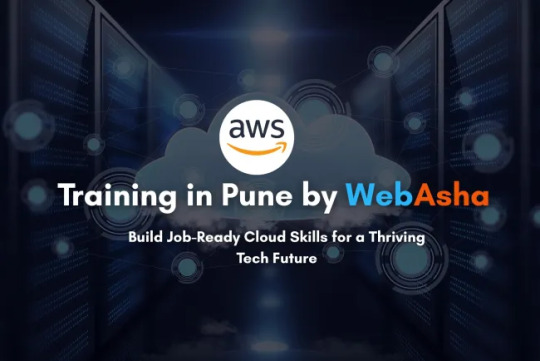
In the era of digital transformation, cloud computing is no longer a luxury—it's a necessity. Whether you’re starting your career or aiming to upgrade your technical skill set, one certification stands out among the rest: AWS. And where better to start than with expert-led AWS Training in Pune at WebAsha Technologies?
Why AWS Certification Matters in Today’s IT Landscape
Amazon Web Services (AWS) dominates the cloud market with its reliable, scalable, and flexible platform, which is used by millions of businesses worldwide. Earning an AWS certification demonstrates your ability to design, deploy, and manage cloud-based solutions—a skill set that is increasingly sought after by top employers.
Benefits of Getting AWS Certified
Gain global recognition and credibility
Unlock higher-paying job opportunities
Strengthen your foundational and advanced cloud knowledge
Become eligible for roles like Cloud Architect, DevOps Engineer, and more
Stand out in interviews with verified cloud skills
Kickstart Your Journey with AWS Training in Pune
If you're in Pune—a rapidly growing IT and tech hub—there’s no better time or place to begin your cloud learning path. With AWS Training in Pune offered by WebAsha Technologies, you’ll learn directly from industry experts and gain hands-on experience that prepares you for real-world cloud environments.
Why Choose WebAsha Technologies?
At WebAsha Technologies, we don’t just teach cloud computing—we build cloud professionals. Our training goes beyond theory, providing you with the tools and confidence to earn your certification and succeed in the workforce.
What Makes Our AWS Training Unique?
Certified and experienced trainers
Real-time projects and lab sessions
Updated course content aligned with AWS exams
Interview preparation and placement support
Flexible batch timings for working professionals and students
What You Will Learn in Our AWS Training Program
Our structured curriculum ensures you’re not just exam-ready—but job-ready.
Core Modules Include:
Introduction to Cloud Computing and AWS Ecosystem
AWS Compute Services (EC2, Lambda)
Storage Solutions (S3, EBS, Glacier)
Networking and Security (VPC, IAM)
Database Management (RDS, DynamoDB)
Monitoring and Auto-Scaling
Deployment and CI/CD with AWS Tools
Hands-on Projects and Mock Certification Tests
Who Should Enroll in AWS Training in Pune?
Whether you’re a fresher or an experienced professional, our training is tailored for:
Aspiring Cloud Engineers and Architects
IT Professionals and Developers
DevOps Practitioners
Network and System Administrators
College Students Seeking Future-Proof Careers
Take the First Step Toward AWS Certification
At WebAsha Technologies, our goal is simple—empowering you with in-demand cloud skills through the best-in-class AWS Training in Pune. By the end of this course, you’ll be ready to clear your AWS certification exams and step confidently into the world of cloud computing.
0 notes